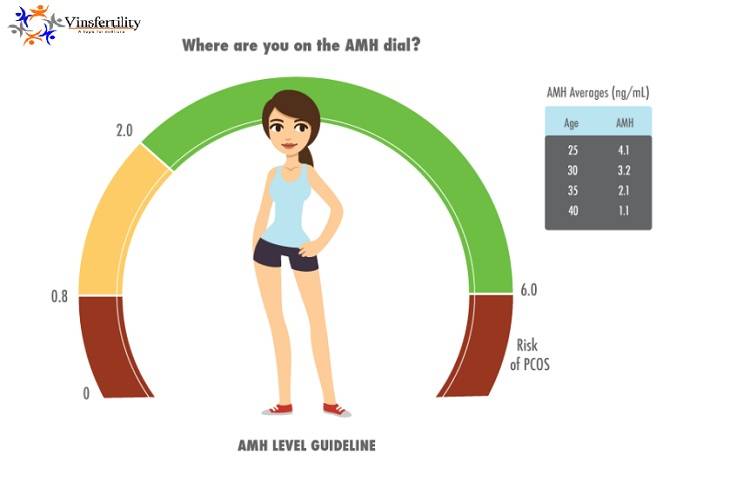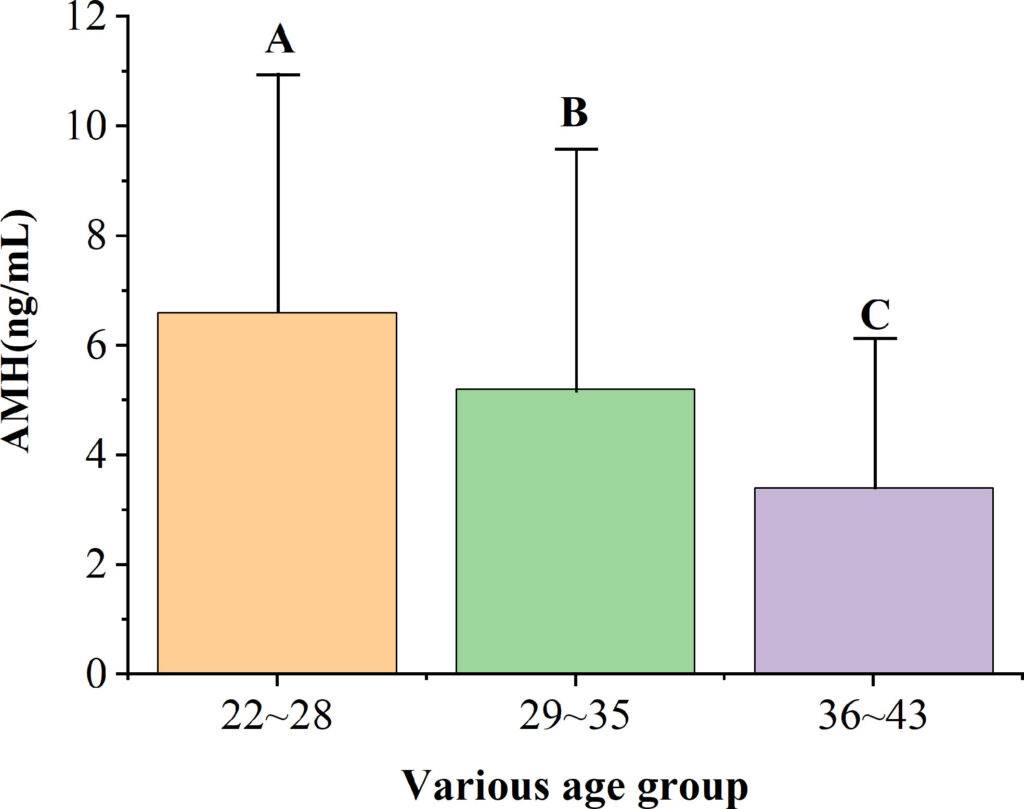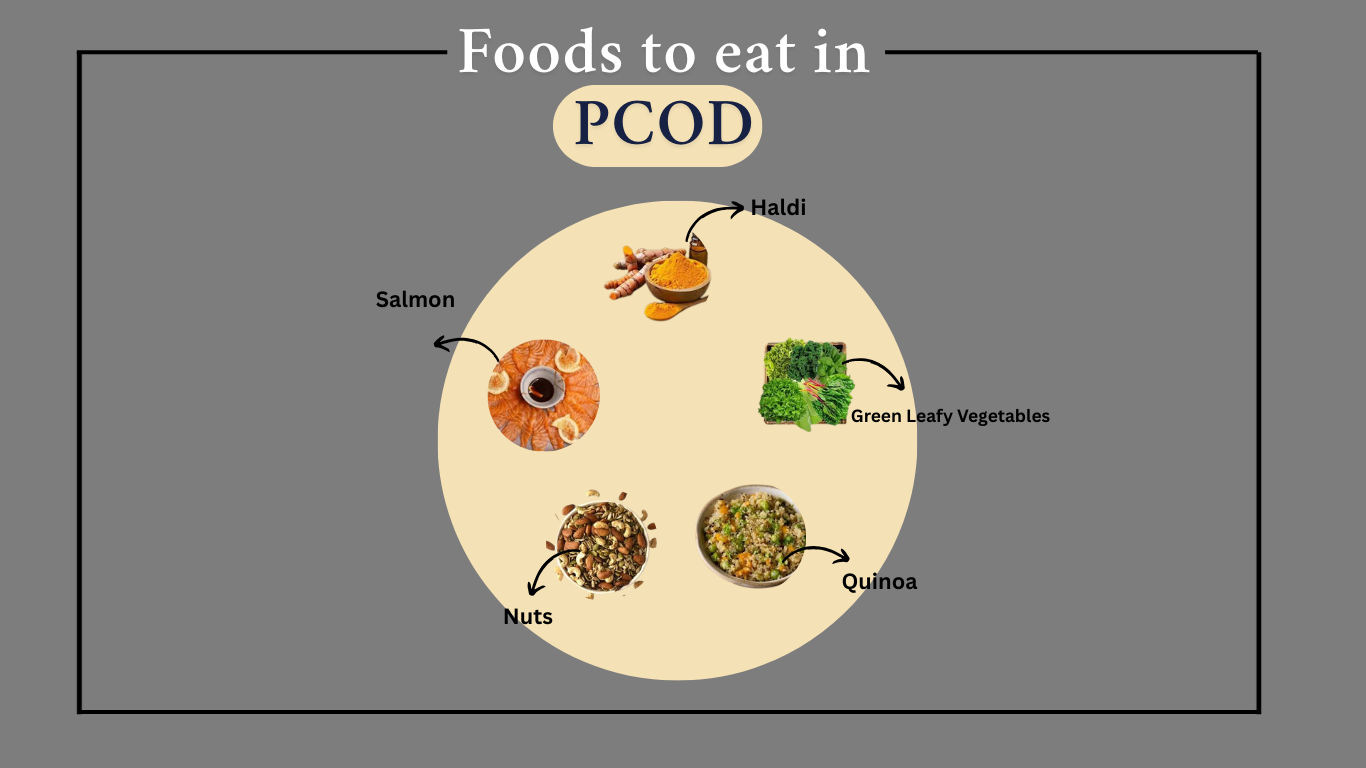
What is AMH? - Vinsfertility.com
Anti-Mullerian Hormone
AMH, whose full - form is ‘Anti-Mullerian hormone’. It is a protein hormone which is essential in the growth of the reproductive tract in a man foetus and is also built by the testes and ovaries.
- AMH hormone is a substance brought out by granulosa cells in ovarian follicles.
- It is initially created in primary follicles that move along from the primordial follicle phase. At these phases follicles are tiny and can not be visible through ultrasound.
- Anti-Mullerian Hormone creation is extreme in preantral and compact antral phases of evolution.
- Production reduces and later avert as follicles evolve. There is almost no Anti-Mullerian Hormone which is built in follicles over 8mm.
- Thus, the amounts are reasonably regular and the AMH test can be done on any day of a female's cycle.
AMH Levels
Anti-Mullerian Hormone is a laboratory experiment that OB GYN and fertility medical practitioners may try to evaluate a woman’s ovarian reserve. This hormone is given rise to by the tiny follicles in a females’ ovaries. AMH is used as a label of oocyte amount.
What is normal AMH level for age?
The normal AMH levels are according to the age:-| Under 30 | 2.91 |
| 30-34 | 2.42 |
| 35-37 | 2.03 |
| 38-40 | 1.50 |
| 41-42 | .92 |
| Over 42 | .59 |
What is a good AMH level to get pregnant?
1. Your Anti Mullerian Hormone amount isn’t an evaluation of whether or not you can get pregnant right now. Firstly, your AMH amount informs you only about how many eggs you have left but nothing about the quality of those eggs, which is precisely much more crucial when it comes to becoming pregnant. There’s no examination for egg quality, but it reduces with age in a foreseeable way.
2. AMH amounts can’t inform us if you have uterine scarring, and fibroids that might make it tougher to conceive. An AMH test also can’t notify us how fast your egg count is declining, since it’s just an image of your levels at one particular spot in time.
3. Yet, that doesn’t define that it’s not helpful. A specifically low Anti Mullerian Hormone for your age can denote the chances of premature menopause, while an unbalanced high AMH levels may indicate polycystic ovary syndrome (PCOS), a hormone abnormality that can make it tougher to get pregnant. And in the world of egg freezing, AMH serves us one analytical piece of information: how many eggs you’ll be precisely to freeze in one cycle.
4. Most females desire to understand whether their Anti-Mullerian Hormone amounts are excessive or lesser than the AMH normal range. When it comes to AMH, what’s really “standard”? Since, AMH has only been constantly tested in females who meet medical practitioners later having trouble conceiving, previous averages have been dependent on a population that involves several women with fertility issues. In order to genuinely understand where your Anti-Mullerian Hormones level plunge on the spectrum, you will require to contrast it to a population of females without known fertility problems. We carried out such studies via the Center for Fertility Research & Education (CFRE).
5. In our analysis, we glanced at the outcomes of over two thousand six hundred AMH examinations among non-infertile females who had come to increase Fertility for a fertility evaluation. As anticipated, AMH was critically linked with age. If stated in a layman language, as age rises, Anti-Mullerian Hormone amounts get reduced.
How to increase AMH levels?
There are some things which you can do to increase AMH levels that helps overall health as well:- 1. If you smoke or consume any tobacco products, work with your doctor to avert as soon as feasible. 2. If one is overweight or obese, strive after a standard BMI range. As little as five to ten percent of body weight loss can excel responsiveness to fertility medications and better the reproductive outcomes. 3. Consider having your vitamin D measures checked, and talk through filling it if lacking with your doctor.AMH Test

- The AMH blood test evaluates the amount of anti-mullerian hormone in the blood. Anti-Mullerian Hormone is built in the reproductive tissues of both women and men. The part of AMH and so long as levels are usually dependent on your gender and age.
- It plays a vital part in the evolution of sex organs in an unborn child. At the time of initial weeks of pregnancy, a child will begin growing reproductive organs. The baby will so far have the genes to convert into either a female (XX genes) or a male (XY genes).
- If the child has male (XY) genes, extreme levels of AMH are created, further with other male hormones. This stops the growth of female organs and encourages the development of male organs. If there is not sufficient AMH to prevent the evolution of female organs, there can be chances that organs of both sexes may develop. If this takes place, a baby's privates may not be understandably recognized as female or male. This is studied as ambiguous genitalia.
- If the unborn child has women (XX) genes tiny amounts of AMH are created. This led to the growth of female reproductive organs. Anti-Mullerian Hormone has a distinctive role for females later puberty. At that time, the ovaries (glands that make egg cells) start making AMH. The additional egg cells there are, the increased the level of AMH.
- In females, AMH amounts can allow knowledge about fertility, the potential to get pregnant. The examination may also be used to support determination of menstrual unbalance or to detect the health of females with particular types of ovarian cancer.
- In India, the AMH test price is 1000 rupees.
What is sperm motility?
Sperm motility denotes the potential of the sperm to swim the right way. Healthy sperm motility is interpreted as sperm with advancing development of at least twenty-five micrometers each second. If a male has below par sperm potency, it is known as asthenospermia. There are distinctive types of sperm motility problems, which includes:
- Moderate or inactive progressive motility
- non-progressive motility, which is known as anything below five micrometers per second
- No ability to move
Normal Sperm Motility
The motility of sperm along with the shape & sperm count are crucial for examining for male factor infertility. Your doctor may suggest you to do the testing upto three tests of sperm at separate visits to get an exact analysis. The normal sperm motility range is determined as sperm with forward development of at least twenty-five micrometers per second.
Sperm Motility Range Chart
 (Source: ScienceDirect.com)
(Source: ScienceDirect.com)
How to increase sperm Motility?
Infertility is more usual than you might think. Every six couples are suffering with this problem and researchers evaluate about one in each and every three cases is anticipated through fertility issues in the male partner alone. While infertility is not always curable, there are some things you can do to increase your options of conceiving. Fertility can sometimes be better with supplements, a healthy diet, and other lifestyle approaches. Here are some ways to increase sperm count and escalate fertility in men:-
- Exercise Regularly
As we already know that exercising regularly is good for general health, exercising regularly can help in betterment of fertility. Studies state that male who workout daily have much better semen quality as compared to men who don’t exercise at all. Although, you should always keep in mind that too much work out can also impact the sperm quality and fertility in a bad way. So, keep the balance.
- Get enough Zinc
Zinc is a vital mineral found in high levels in non-veg, such as shellfish,meat, eggs, and fish. Acquiring adequate zinc is among the cornerstones of men's fertility. Observational studies state that low zinc status is linked with poor sperm quality, low testosterone amounts, and a high risk of male infertility. Taking zinc supplements heightens testosterone levels and sperm count in those who are less in zinc. Moreover, zinc supplements may lessen the decreased testosterone amounts that are linked with excessive levels of high-intensity exercise.
- Relax and minimize stress
Having stress for a long time can actually affect your cortisol level in a bad way. When cortisol increases, testosterone levels decrease. As with the help of the right medications one can get treated from his/her serious anxiety issues, milder forms of stress can easily be reduced by just keeping yourself relaxed. You can begin your therapy through stress management, which is to exercise, hangout with the people you consider close or just a walk in a park where you are near to nature.
- Get enough vitamin D
In an observational study, it is stated that the men who are suffering from lack of vitamin-D are those who have more probability to have less testosterone levels. Vitamin-D can be crucial for both female and male fertility. It can be among those nutrients that can improve testosterone levels.
How Sleep Affects Sperm Count & Male Infertility?
Recent search proposes that sleeping too little or too long can attack a man's potential to impregnate his partner. The pleasing spot emerges to be seven to eight hours of sleep a night.
Among the seven hundred ninety couples which are followed by the researchers to understand it better. They discovered that both short and long sleep timings which are less than six hours or more than nine hours of sleep were related with a lessened chances of pregnancy.
Using eight hours of sleep as the reference point, men who REST less than six or more than nine hours a night had a forty-two percent reduced probability of conception in any given month.
Fertility specialists understand that testosterone is important for reproduction and the most regular testosterone liberated in men happens while sleeping. The entire sleep time has been positively associated with testosterone levels in various studies.
Low Sperm Count Treatment
Treatments for low sperm count include:- Surgery - a varicocele can frequently be surgically rectified and can be restored. Earlier vasectomies can be back-pedal. In cases where no sperm are nearby in the ejaculate, sperm can frequently be recovered straightly from the testicles using sperm retrieval techniques.
- Treating infections. Antibiotics can cure an infection of the reproductive tract, but this doesn't always restore skills.
- Treatments for sexual intercourse problems. Counseling or medication can support in bettering the fertility in conditions such as erectile dysfunction.
- Hormone treatments. Your doctor might suggest hormone renewal in cases where infertility is happened by high or low amounts of specific hormones with the way the body uses hormones.
- Assisted reproductive technology (ART). ART therapy includes acquiring sperm through standard ejaculation, surgical extraction or from donor individuals, based on your particular situation. The sperm are then inserted into the women genital tract, or used for IVF or intracytoplasmic sperm injection.






